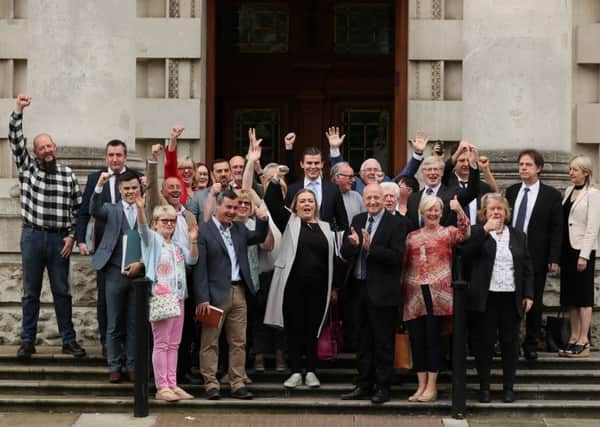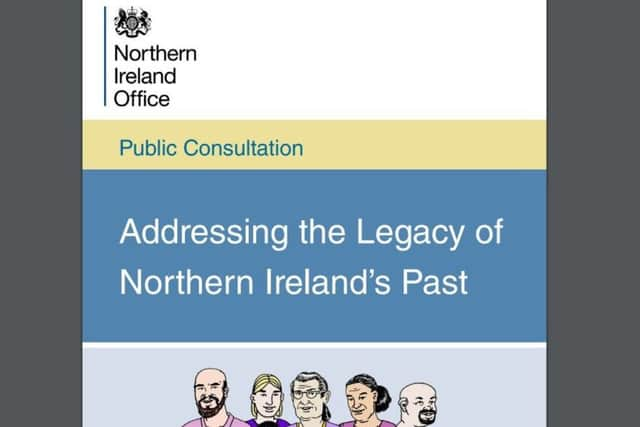Ben Lowry: Yet another worrying day for anyone who fears that the legacy of the Troubles is being handled unfairly


Results of a public consultation on the Stormont House Agreement (SHA) plans to deal with our past were revealed.
And the Appeal Court issued a ruling in a legal case relating to the loyalist Glenanne gang.
Advertisement
Hide AdAdvertisement
Hide AdThe two stories were still leading the BBC website late last evening.


On Glenanne, the BBC reported that the court ruled a police investigation into collusion must be held (it didn’t — more on that further down this article).
The BBC report on the legacy consultation, by their excellent political editor Mark Devenport, was accurate however.
The legacy consultation, which got 17,000 written responses, had indeed been said to have found that “a clear majority of all respondents [the document’s use of bold] to the consultation argued that a statute of limitations or amnesty would not be appropriate for Troubles-related matters ... there was a strong sense that the new mechanisms must ... not favour any particular group”.
Advertisement
Hide AdAdvertisement
Hide AdThe consultation does not specify whether it is referring to an amnesty for veterans or terrorists, but the word statute of limitations has primarily been used to refer to processes that refer to ex military (and which might, if introduced, be extended to terrorists).
Nor does the consultation quantify the level of opposition, say 67% or 83%, but the summary does at several points make clear that a view is overwhelmingly held.
On the controversial legacy inquests, the legacy said:
“Almost all respondents who ... commented on inquests argued that the lord chief justice’s five-year plan for legacy inquests should receive immediate funding to enable outstanding inquests to commence as quickly as possible.”
This newspaper has scrutinised concerns that these inquests, costing £1 million per case, are at the heart of the legacy imbalance.
Advertisement
Hide AdAdvertisement
Hide AdAlmost all of the cases relate to alleged failures by the security forces. Around 40 of the 90+ dead were terrorist, and this could lead to the grave injustice that more money is spent investigating their deaths than the deaths of their victims.
The inquests were on hold for a long period of time until approved by a civil servant earlier this year.
Some contributors to our Stop The Legacy Scandal series (link below to the essays) detailed grave concerns about inquests becoming mini inquiries against the state.
So in two major areas of most concern to nationalists — statute of limitations and legacy inquests — the consultation found that their view is apparently widely shared. This could be seized upon to give legitimacy to their concerns.
Advertisement
Hide AdAdvertisement
Hide AdBut there was no such finding on a concern widely held by unionists, the definition of a victim. The consultation found: “Many people ... felt that attempts to redefine ‘victim’ would lead to exclusion and marginalisation of a significant number of victims ...
“Others ... argued that it was unacceptable that anyone who was injured or killed as a result of their own involvement in terrorism could be known as a victim ...”
On this most contested issue, responses are presented as 50/50.
Perhaps they were.
The Time for Truth campaign, which is seen by unionists as being focused on killings by state forces, said in a Tweet in May that it had 14,875 responses to the consultation. Time for Truth also said in late 2018 that it had submitted a much lower figure of 6,000 responses.
Advertisement
Hide AdAdvertisement
Hide AdEven the lower figure would be more than a third of legacy total submissions. State forces killed 10% of the Troubles dead (republicans say many more died in collusion).
Some people who believe there is unbalanced pursuit of state forces have feared that this consultation is all about pushing through the SHA legacy structures (some of the excellent contributions to our essay series persuaded me that the plans are ultimately better for terrorists).
But if there was a disproportionate number of consultation responses from people who focus on state wrongdoing, then would be no surprise that the anger about the victim definition has not emerged as a key consultation finding.
The consultation found that “most agreed” that the current system for dealing with legacy needs reform. This appears to be good news for critics who say the status quo is unfair on security forces, but not if it pushes through structures that make it worse (that Sinn Fein is insisting the SHA be implemented is hardly encouraging).
Advertisement
Hide AdAdvertisement
Hide AdIt is not all bad news. The consultation does say most responses to the fact that the RUC alone will be subject to past misconduct investigations thought it unfair (as it patently is — see Neil Faris’s essay in our series on this outrageous plan).
It also says many consultation respondents felt that victims who got a Historical Enquiries Team (HET) report should also get an investigation from the proposed Historical Investigations Unit (HIU).
Meanwhile, in the Glenanne Court of Appeal case, judges did not say an independent investigation into alleged collusion with the Glenanne gang must be held, as the BBC and other media outlets reported, and as campaigners claimed (just as the Supreme Court did not, as claimed, order a public inquiry into the murder of Pat Finucane).
In fact, the appeal court, while it said police had not honoured the “legitimate expectation” of Gleananne victims of an over-arching investigation, overturned the original judge, Mr Justice Treacy, in his so-called Order of Mandamus.
Advertisement
Hide AdAdvertisement
Hide AdBut the mis-reporting of the ruling seemed not to matter. The new PSNI chief constable rolled over anyway, and will conduct the probe.
• After the judgement was given, and while the court was still full of relatives, there was an extraordinary moment. A man linked to the hooded man case stood up and loudly declaimed at the lord chief justice Sir Declan Morgan that a decision in his case, which was up for mention, had not yet been reached.
In what came close to a rant, the man said he had been given previous dates for when it would be resolved. The court stayed full as everyone watched this prolonged outburst. Sir Declan listened and then calmly explained that the court had had to wait for recent Supreme Court ruling on the Pat Finucane case.
Then the man continued to speak loudly at the top judge. When was the Finucane ruling, he asked? Was it not back in April, he demanded? This is like more torture he said.
Again, Sir Declan listened to this before replying.
Advertisement
Hide AdAdvertisement
Hide AdAs the man appeared to begin a third monologue, a lawyer in front of him turned round and seemed to move his head, as if to suggest he stop this outburst, and the man did stop speaking.